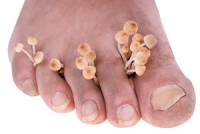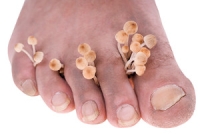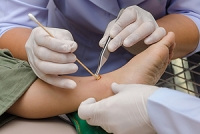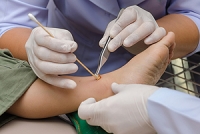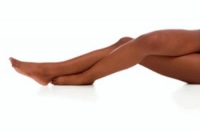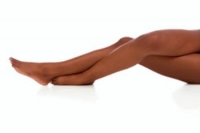
Blog (807)
It's Time for Beautiful Feet
How to Prevent Fungal Infections on the Foot
While most fungal infections of the foot, such as athlete’s foot, are typically non-serious conditions, they can still cause red, itchy and dry feet. This can be very uncomfortable; however, it can be prevented. Keeping your feet clean and dry can prevent fungus from developing. Use talcum powder if your feet become too sweaty. Socks and stockings should be changed daily and should be breathable to prevent sweat. It is advised to change your shoes every couple of days. Shoes that are roomy and allow the feet to breathe are also recommended. Avoid going barefoot in public bathrooms, locker rooms, and changing rooms since these places can harbor fungus. Fungal infections are no fun, but they can be prevented. If you think you have a fungal infection on your foot, see a podiatrist for a diagnosis.
Athlete’s foot is an inconvenient condition that can be easily reduced with the proper treatment. If you have any concerns about your feet and ankles, contact Dr. Kenneth Donovan from Advanced Care Foot and Ankle.
Our doctor will treat your foot and ankle needs.
Athlete’s Foot: The Sole Story
Athlete's foot, also known as tinea pedis, can be an extremely contagious foot infection. It is commonly contracted in public changing areas and bathrooms, dormitory style living quarters, around locker rooms and public swimming pools, or anywhere your feet often come into contact with other people.
Solutions to Combat Athlete’s Foot
- Hydrate your feet by using lotion
- Exfoliate
- Buff off nails
- Use of anti-fungal products
- Examine your feet and visit your doctor if any suspicious blisters or cuts develop
Athlete’s foot can cause many irritating symptoms such as dry and flaking skin, itching, and redness. Some more severe symptoms can include bleeding and cracked skin, intense itching and burning, and even pain when walking. In the worst cases, Athlete’s foot can cause blistering as well. Speak to your podiatrist for a better understanding of the different causes of Athlete’s foot, as well as help in determining which treatment options are best for you.
If you have any questions please feel free to contact one of our offices located in Warren, Livingston, and Toms River, NJ. We offer the newest diagnostic and treatment technologies for all your foot and ankle needs.
How to Prevent Fungal Infections on the Foot
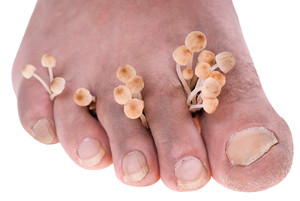 While most fungal infections of the foot, such as athlete’s foot, are typically non-serious conditions, they can still cause red, itchy and dry feet. This can be very uncomfortable; however, it can be prevented. Keeping your feet clean and dry can prevent fungus from developing. Use talcum powder if your feet become too sweaty. Socks and stockings should be changed daily and should be breathable to prevent sweat. It is advised to change your shoes every couple of days. Shoes that are roomy and allow the feet to breathe are also recommended. Avoid going barefoot in public bathrooms, locker rooms, and changing rooms since these places can harbor fungus. Fungal infections are no fun, but they can be prevented. If you think you have a fungal infection on your foot, see a podiatrist for a diagnosis.
While most fungal infections of the foot, such as athlete’s foot, are typically non-serious conditions, they can still cause red, itchy and dry feet. This can be very uncomfortable; however, it can be prevented. Keeping your feet clean and dry can prevent fungus from developing. Use talcum powder if your feet become too sweaty. Socks and stockings should be changed daily and should be breathable to prevent sweat. It is advised to change your shoes every couple of days. Shoes that are roomy and allow the feet to breathe are also recommended. Avoid going barefoot in public bathrooms, locker rooms, and changing rooms since these places can harbor fungus. Fungal infections are no fun, but they can be prevented. If you think you have a fungal infection on your foot, see a podiatrist for a diagnosis.
Athlete’s foot is an inconvenient condition that can be easily reduced with the proper treatment. If you have any concerns about your feet and ankles, contact Dr. Kenneth Donovan from Advanced Care Foot and Ankle. Our doctor will treat your foot and ankle needs.
Athlete’s Foot: The Sole Story
Athlete's foot, also known as tinea pedis, can be an extremely contagious foot infection. It is commonly contracted in public changing areas and bathrooms, dormitory style living quarters, around locker rooms and public swimming pools, or anywhere your feet often come into contact with other people.
Solutions to Combat Athlete’s Foot
- Hydrate your feet by using lotion
- Exfoliate
- Buff off nails
- Use of anti-fungal products
- Examine your feet and visit your doctor if any suspicious blisters or cuts develop
Athlete’s foot can cause many irritating symptoms such as dry and flaking skin, itching, and redness. Some more severe symptoms can include bleeding and cracked skin, intense itching and burning, and even pain when walking. In the worst cases, Athlete’s foot can cause blistering as well. Speak to your podiatrist for a better understanding of the different causes of Athlete’s foot, as well as help in determining which treatment options are best for you.
If you have any questions please feel free to contact one of our offices located in Warren, Livingston, and Toms River, NJ . We offer the newest diagnostic and treatment technologies for all your foot and ankle needs.
Keeping Your Children’s Feet Healthy
Children have delicate feet that are still developing as they get older. Therefore, it is up to parents to make sure that their children’s feet are healthy. There are some things a parent can do or be on the lookout for. When it comes to footwear, parents should check their children’s shoes frequently to see if they properly fit. When it comes time that your children want to get pedicures, make sure that the salon they visit is clean; this can help prevent infections of the foot from fungus. Flat feet, ingrown toenails, and warts are not uncommon among children but can be taken care of. If you see anything abnormal with your child’s feet, see a podiatrist who can diagnose them.
Making sure that your children maintain good foot health is very important as they grow. If you have any questions, contact Dr. Kenneth Donovan of Advanced Care Foot and Ankle. Our doctor can provide the care you need to keep you pain-free and on your feet.
Keeping Children's Feet Healthy
Having healthy feet during childhood can help prevent medical problems later in life, namely in the back and legs. As children grow, their feet require different types of care. Here are some things to consider…
Although babies do not walk yet, it is still very important to take care of their feet.
Avoid putting tight shoes or socks on his or her feet.
Allow the baby to stretch and kick his or her feet to feel comfortable.
As a toddler, kids are now on the move and begin to develop differently. At this age, toddlers are getting a feel for walking, so don’t be alarmed if your toddler is unsteady or ‘walks funny’.
As your child gets older, it is important to teach them how to take care of their feet.
Show them proper hygiene to prevent infections such as fungus.
Be watchful for any pain or injury.
Have all injuries checked by a doctor as soon as possible.
Comfortable, protective shoes should always be worn, especially at play.
If you have any questions please feel free to contact one of our offices located in Warren, Livingston, and Toms River, NJ. We offer the newest diagnostic and treatment technologies for all your foot and ankle needs.
Read more about What to Do to Keep Your Child’s Feet Healthy
Taking Care of Minor Foot Wounds In Diabetics
A major problem among those who suffer from diabetes is poor blood circulation and nerve damage. This can lead to diabetics developing foot ulcers that don’t heal properly or quickly. In more severe cases in which the wound has become infected, this can lead to amputation. The first step is to keep the diabetes in check by observing blood glucose levels and staying healthy. Inspecting the foot daily is important because nerve damage can prevent a diabetic from realizing they have an ulcer. Foot inspections can help diabetics discover a wound early so they can alert a podiatrist. If there is a wound, diabetics should wash the wound with saline or clean water. Applying an antibiotic ointment and covering with a bandage is also important. However these solutions are only temporary, and you should see a podiatrist if you have a foot ulcer.
Diabetic foot care is important in preventing foot ailments such as ulcers. If you are suffering from diabetes or have any other concerns about your feet, contact Dr. Kenneth Donovan from Advanced Care Foot and Ankle. Our doctor can provide the care you need to keep you pain-free and on your feet.
Diabetic Foot Care
Diabetes affects millions of people every year. The condition can damage blood vessels in many parts of the body, especially the feet. Because of this, taking care of your feet is essential if you have diabetes, and having a podiatrist help monitor your foot health is highly recommended.
The Importance of Caring for Your Feet
- Routinely inspect your feet for bruises or sores.
- Wear socks that fit your feet comfortably.
- Wear comfortable shoes that provide adequate support.
Patients with diabetes should have their doctor monitor their blood levels, as blood sugar levels play such a huge role in diabetic care. Monitoring these levels on a regular basis is highly advised.
It is always best to inform your healthcare professional of any concerns you may have regarding your feet, especially for diabetic patients. Early treatment and routine foot examinations are keys to maintaining proper health, especially because severe complications can arise if proper treatment is not applied.
If you have any questions please feel free to contact one of our offices located in Warren, Livingston, and Toms River, NJ. We offer the newest diagnostic and treatment technologies for all your foot and ankle needs.
Taking Care of Minor Foot Wounds In Diabetics
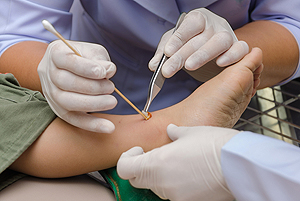 A major problem among those who suffer from diabetes is poor blood circulation and nerve damage. This can lead to diabetics developing foot ulcers that don’t heal properly or quickly. In more severe cases in which the wound has become infected, this can lead to amputation. The first step is to keep the diabetes in check by observing blood glucose levels and staying healthy. Inspecting the foot daily is important because nerve damage can prevent a diabetic from realizing they have an ulcer. Foot inspections can help diabetics discover a wound early so they can alert a podiatrist. If there is a wound, diabetics should wash the wound with saline or clean water. Applying an antibiotic ointment and covering with a bandage is also important. However these solutions are only temporary, and you should see a podiatrist if you have a foot ulcer.
A major problem among those who suffer from diabetes is poor blood circulation and nerve damage. This can lead to diabetics developing foot ulcers that don’t heal properly or quickly. In more severe cases in which the wound has become infected, this can lead to amputation. The first step is to keep the diabetes in check by observing blood glucose levels and staying healthy. Inspecting the foot daily is important because nerve damage can prevent a diabetic from realizing they have an ulcer. Foot inspections can help diabetics discover a wound early so they can alert a podiatrist. If there is a wound, diabetics should wash the wound with saline or clean water. Applying an antibiotic ointment and covering with a bandage is also important. However these solutions are only temporary, and you should see a podiatrist if you have a foot ulcer.
Diabetic foot care is important in preventing foot ailments such as ulcers. If you are suffering from diabetes or have any other concerns about your feet, contact Dr. Kenneth Donovan from Advanced Care Foot and Ankle. Our doctor can provide the care you need to keep you pain-free and on your feet.
Diabetic Foot Care
Diabetes affects millions of people every year. The condition can damage blood vessels in many parts of the body, especially the feet. Because of this, taking care of your feet is essential if you have diabetes, and having a podiatrist help monitor your foot health is highly recommended.
The Importance of Caring for Your Feet
- Routinely inspect your feet for bruises or sores.
- Wear socks that fit your feet comfortably.
- Wear comfortable shoes that provide adequate support.
Patients with diabetes should have their doctor monitor their blood levels, as blood sugar levels play such a huge role in diabetic care. Monitoring these levels on a regular basis is highly advised.
It is always best to inform your healthcare professional of any concerns you may have regarding your feet, especially for diabetic patients. Early treatment and routine foot examinations are keys to maintaining proper health, especially because severe complications can arise if proper treatment is not applied.
If you have any questions please feel free to contact one of our offices located in Warren, Livingston, and Toms River, NJ . We offer the newest diagnostic and treatment technologies for all your foot and ankle needs.
Read more about How to Care for Diabetic FootHeel Pain Can Be Treated!
Heel Pain Can Be Treated!
Dealing with Foot Pain
If you want to start taking care of your feet, the first step is to make sure you are wearing shoes that fit you properly. Wearing improper footwear can cause a lot of damage to your feet, and leave you in a lot of pain. If you are experiencing pain in your feet, you should be careful not to ignore it. A common source of foot pain is plantar fasciitis, but this condition can be avoided by stretching your feet and avoiding standing for long periods of time. Another tip you should follow if you want healthy feet is to get routine pedicures. Not only do pedicures help your feet feel more relaxed, but they also help them stay strong and healthy.
Everyday foot care is very important to prevent infection and other foot ailments. If you need your feet checked, contact Dr. Kenneth Donovan from Advanced Care Foot and Ankle. Our doctor can provide the care you need to keep you pain-free and on your feet.
Everyday Foot Care
Often, people take care of their bodies, face and hair more so than they do for their feet. But the feet are a very important aspect of our bodies, and one that we should pay more attention to. Without our feet, we would not be able to perform most daily tasks.
It is best to check your feet regularly to make sure there are no new bruises or cuts that you may not have noticed before. For dry feet, moisturizer can easily be a remedy and can be applied as often as necessary to the affected areas. Wearing shoes that fit well can also help you maintain good foot health, as well as making it easier to walk and do daily activities without the stress or pain of ill-fitting shoes, high heels, or even flip flops. Wearing clean socks with closed shoes is important to ensure that sweat and bacteria do not accumulate within the shoe. Clean socks help to prevent Athlete’s foot, fungi problems, bad odors, and can absorb sweat.
If you have any questions please feel free to contact one of our offices located in Warren, Livingston, and Toms River, NJ. We offer the newest diagnostic and treatment technologies for all your foot and ankle needs.
Dealing with Foot Pain
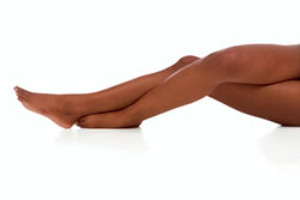 If you want to start taking care of your feet, the first step is to make sure you are wearing shoes that fit you properly. Wearing improper footwear can cause a lot of damage to your feet, and leave you in a lot of pain. If you are experiencing pain in your feet, you should be careful not to ignore it. A common source of foot pain is plantar fasciitis, but this condition can be avoided by stretching your feet and avoiding standing for long periods of time. Another tip you should follow if you want healthy feet is to get routine pedicures. Not only do pedicures help your feet feel more relaxed, but they also help them stay strong and healthy.
If you want to start taking care of your feet, the first step is to make sure you are wearing shoes that fit you properly. Wearing improper footwear can cause a lot of damage to your feet, and leave you in a lot of pain. If you are experiencing pain in your feet, you should be careful not to ignore it. A common source of foot pain is plantar fasciitis, but this condition can be avoided by stretching your feet and avoiding standing for long periods of time. Another tip you should follow if you want healthy feet is to get routine pedicures. Not only do pedicures help your feet feel more relaxed, but they also help them stay strong and healthy.
Everyday foot care is very important to prevent infection and other foot ailments. If you need your feet checked, contact Dr. Kenneth Donovan from Advanced Care Foot and Ankle. Our doctor can provide the care you need to keep you pain-free and on your feet.
Everyday Foot Care
Often, people take care of their bodies, face and hair more so than they do for their feet. But the feet are a very important aspect of our bodies, and one that we should pay more attention to. Without our feet, we would not be able to perform most daily tasks.
It is best to check your feet regularly to make sure there are no new bruises or cuts that you may not have noticed before. For dry feet, moisturizer can easily be a remedy and can be applied as often as necessary to the affected areas. Wearing shoes that fit well can also help you maintain good foot health, as well as making it easier to walk and do daily activities without the stress or pain of ill-fitting shoes, high heels, or even flip flops. Wearing clean socks with closed shoes is important to ensure that sweat and bacteria do not accumulate within the shoe. Clean socks help to prevent Athlete’s foot, fungi problems, bad odors, and can absorb sweat.
If you have any questions please feel free to contact one of our offices located in Warren, Livingston, and Toms River, NJ . We offer the newest diagnostic and treatment technologies for all your foot and ankle needs.
Read more about Every Day Foot Care

